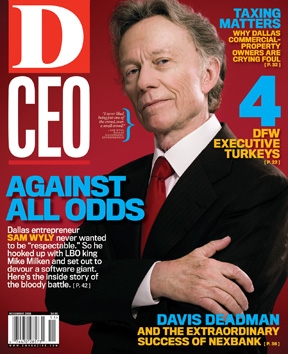
So what now? Should we rename the Dee and Charles Wyly Theatre, black out the sign on the Sam Wyly Hall at the University of Michigan’s business school, and knock over the Wyly Tower of Learning at Louisiana Tech? Does today’s decision by a jury of eight men and four women in New York — including a former model and the owner of an auto parts shop — permanently stain the business legacy of Sam and Charles Wyly?
It could. After all, the jury agreed with the SEC’s assertion that the brothers spent a dozen years orchestrating a network of offshore trusts so they could buy and sell shares in companies like Michael’s Stores and Sterling Software without having to report those transactions to the SEC. In other words, the jury agreed that the Wyly brothers spent a dozen years lying to shareholders and to the SEC about stock purchases and sales in companies they controlled. In even other words: the jury says the Wylys are guilty of fraud.
To be sure, the Wylys’ reputation had already been stained before the jury returned its verdict. I tracked the Wylys case over three years, talking to their friends, business associates, competitors, and their detractors, and it was clear that the SEC’s case and an accompanying U.S. Senate investigation into the Wylys’ offshore holdings had already left its mark on them. It made their money — which they’d once used to bankroll portions of the campaigns of two presidents named Bush — worthless in Washington. That personally embarrassed Charles, who had built a reputation in Dallas’ charitable circles as “the last of the true gentlemen,” as Ruth Altshuler, the 88-year-old philanthropist and longtime SMU board member, told me. Sam didn’t seem as upset with the allegations or their impact on his legacy or that of his late brother when I met with him at his Aspen condo in September 2012. But he wasn’t all that happy about how much money it had cost him. (A source I talked to today estimates the Wylys have spent no less than $15 million fighting the SEC’s case.) “I’ve always known we had nothing to fear,” he said. “But it is a burden. It is costly. It has cost money for a long time.”
And with the jury verdict today, how much more money this is going to cost Sam Wyly and Charles Wyly’s estate is an open question.
In their civil case, which took 10 years to go from investigation to trial to jury verdict, the SEC claims that the brothers reaped $550 million in unreported stock gains by using a nod-and-wink system to control the supposedly impartial trustees overseeing their offshore holdings. That’s about half what Forbes said Sam was worth in 2011, the last year he appeared on that magazine’s list of the world’s 400 richest people. The SEC would like the Wylys to “disgorge” some of that $550 million they filtered through the sandy shores of the Cayman Islands, in the Caribbean, or the Isle of Man, in the Irish Sea. But it’ll be up to U.S. District Judge Shira Scheindlin, who is presiding over the case, to decide just how much money the Wylys should be liable for. And her decision will, in part, hinge on deciding how much harm the Wylys did to the market by hiding their transactions from the SEC’s normal reporting requirements.
One person close to the Wylys told me in 2012 that the judge may not find much harm at all. “Even if the Wylys are found liable,” this source said, “none of the transactions were significant enough to have influenced other investors. So what’s the harm to the market?”
Today I called Wayne State University Law School securities law expert Peter Henning, who is one of the few academics who has closely followed the SEC’s arcane case against the Wylys, and asked him what kind of penalties or disgorgement the Wylys could be looking at. “The SEC styled this case as a fraud claim,” Henning says. “But this wasn’t fraud or theft in the direct sense. It’s not like the Wylys stole money from someone directly or ran a Ponzi scheme. The SEC said the Wylys hid their positions in companies they controlled, but that kind of fraud is technical in nature. How much money did they gain from that? It’s possible that this fraud was of little harm. The SEC is going to have to show the judge some hard numbers to prove otherwise.”
And that’s going to take awhile. First, Scheindlin has to preside over the second phase of the SEC’s case against the Wylys. That phase gets underway this August. It will involve the SEC’s claim that the Wylys also violated insider-trading laws by buying up shares of Sterling Software right before the firm was put up for sale. The Wylys had spent a decade building Sterling from a small player in the software industry into a billion-dollar force. And the SEC says that when the brothers cashed in on the Sterling shares (none of which had been reported to the SEC), the trade netted them a $31.7 million profit. There’s nothing easy about that claim, either. The Wylys say their trusts bought Sterling shares months before the company’s board ever discussed, much less approved, a sale. The SEC alleges that the brothers already knew they wanted to sell the company, though, when the stock purchases were made. Judge Scheindlin has already called the SEC’s case on those trades “novel.”
In even other, other words: maybe it’s not yet time to gas up the backhoes and start toppling the monuments to two of Dallas’ most legendary businessmen. For now, Wylys = Guilty. But this complicated case is far from over. “We’ve got another six to 12 months, or maybe two years,” Henning says. “And when you have defendants with $550 million to lose, you know the fight will continue.”




